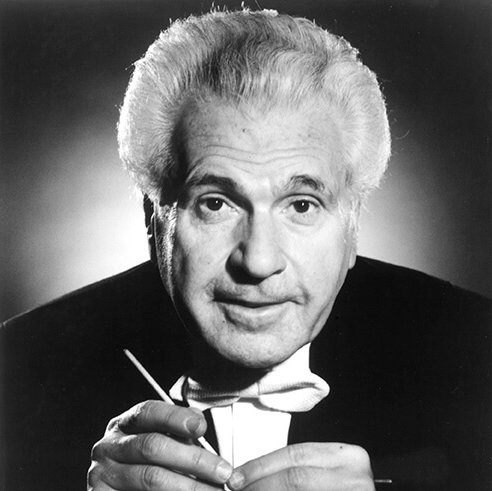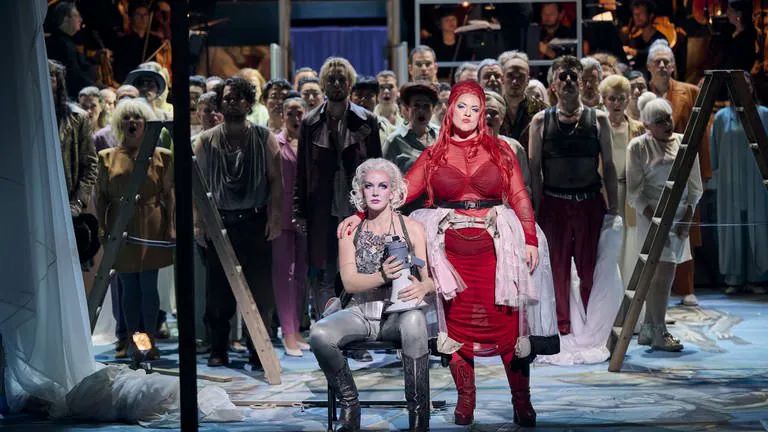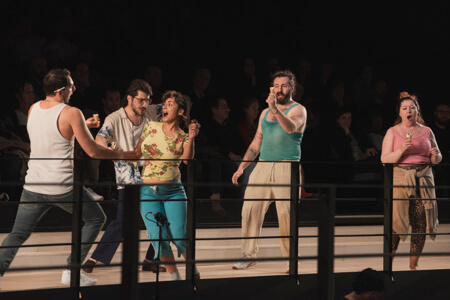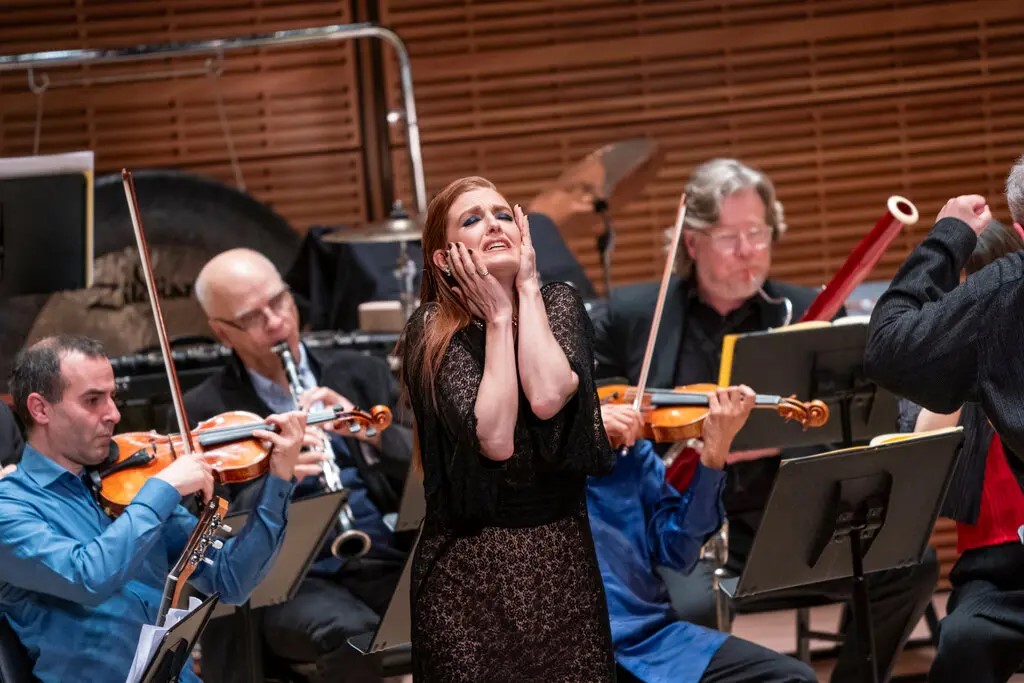
As the end of his stewardship of New York City Opera was drawing near in 1978, Julius Rudel took on a much different role when he accepted Lotte Lenya’s invitation to sit on the Board of Trustees of the Kurt Weill Foundation. He served for thirty years, deploying his considerable administrative and diplomatic skills to advance the Foundation’s mission even as he continued to lead performances of Weill’s works. He earned the Foundation’s Distinguished Achievement Award in 2000, small recompense for great service, and was voted Trustee Emeritus by acclamation when he retired in 2008. The Foundation established the Julius Rudel/Kurt Weill Conducting Fellowship in 2015 to provide young conductors with opportunities to assist experienced conductors in preparing works by Kurt Weill or Marc Blitzstein for performance.
We seize the occasion of his hundredth birthday–6 March 2021–to honor the maestro’s outsize contribution to Weill performance practice by presenting a catalogue of essential performances and recordings from 1958-2008. The list below is not exhaustive, but it offers an overview intended to demonstrate Foundation President Kim H. Kowalke’s encomium in the Fall 2014 issue of the Kurt Weill Newsletter: “After Maurice Abravanel moved to Utah and largely left behind his role as Weill’s foremost conductor-champion, Rudel assumed that mantle.”
Rudel was a vigorous advocate for many composers, but his efforts on behalf of Weill call for special mention. In the late 1950s, he selected two of Weill’s Broadway shows for City Opera’s multi-week celebrations of American opera. This was radical on two counts: it bridged what was then perceived as the chasm between opera and musical theater; and it acknowledged Weill’s essential contributions to American opera, even though he was an immigrant and a “popular” composer. As it turned out, Rudel was vindicated on both artistic and financial grounds, and he returned to Weill again and again over the course of the next fifty years, rescuing from oblivion such works as Die Bürgschaft, Der Silbersee, Der Jasager, Lost in the Stars, and Symphony no. 2.
Read an overview of Rudel’s career with reminiscences from his son Anthony Rudel and Frederica von Stade.
Annotated Catalogue of Performances and Recordings, 1958-2008
Download catalogue
Lost in the Stars, New York City Opera (1958)
Part of a five-week showcase of American opera funded by the Ford Foundation. Rudel had been with City Opera since its beginnings and had risen to General Director; he was instrumental in planning the festival and determined to include operatic works composed for Broadway. He described Lost in the Stars later as “one of the most shattering works I have ever conducted.” The incredible cast included Shirley Verrett (then known as Shirley Carter), Lawrence Winters, Godfrey Cambridge, Louis Gossett, Rosetta LeNoire, Douglas Turner Ward, and an eight-year-old Patti Austin. Ticket sales were so impressive that the company added an extra week of performances. In 1972, as Artistic Director of the new Kennedy Center in Washington, Rudel selected Lost in the Stars to begin a series of American stage works there.
Street Scene, New York City Opera (1960)
While Rudel did not conduct Street Scene when it made its mark in the 1959 sequel to the 1958 American opera festival, he took the podium for the 1960 New York revival, then conducted it on tour as well.
Die Dreigroschenoper, New York City Opera (1965)
Billed as the first staged performance in the U.S. of Die Dreigroschenoper in German (Marc Blitzstein’s English adaptation had been performed all over the country by then). Part of a festival of twentieth-century operas from the U.S. and elsewhere, both work and production were lauded by Harold C. Schonberg of the New York Times, including the “superlative Macheath,” played by Kurt Kasznar. Lotte Lenya had a different opinion; she objected so strongly to Kasznar’s casting that she refused to attend. In his memoir years later, Rudel sided with Lenya: “Kasznar did not have enough machismo for the role.”
Symphony No. 2, Caramoor Festival (1970)
Rudel had taken the reins as Musical Director at Caramoor in 1964. He turned to Weill for a Fourth of July concert that featured three composers born in Europe (de Falla and d’Indy were the others). This was Rudel’s first performance of the symphony he would conduct many more times, notably at Wolf Trap in 1972 and in New York in 1979. He also recorded it; see below.
Silverlake, New York City Opera (1980)
Directed by Harold Prince with Joel Grey in his City Opera debut. As Lenya’s health declined, she sought new board members for the Kurt Weill Foundation and turned to Rudel and Prince, both of whom went on to serve for thirty years. They teamed up on a revival of Weill’s last work in Germany, the play with music Der Silbersee by Georg Kaiser, as adapted for the American stage by Hugh Wheeler and Lys Symonette. During the run, Nonesuch created the cast recording in the studio (Nonesuch Records DB-79003), an early example of purely digital recording; a CD release followed the LP within a year or two. The recording contained much more than the musical numbers; producer Eric Salzman noted, “Only a few spoken lines have been omitted.”
“Lost in the Stars”, Kennedy Center (1985)
Rudel returned to the Kennedy Center to participate in a star-studded benefit concert, not as conductor but as pianist. (His first title at City Opera was “correpetiteur,” and he never lost his touch as a coach and accompanist.) He played for William Warfield as the great bass sang–what else?–“Lost in the Stars.”
Violin Concerto, Kleine Dreigroschenmusik, MusicMasters MMD 60164A, (1988)
Rudel embraced Weill’s music for both stage and concert hall; in this recording, he took on two concert works with the recently formed Orchestra of St. Luke’s. The Violin Concerto, then little-known despite several earlier recordings, and Weill’s arrangement of music from The Threepenny Opera, composed within a few years of each other, sound quite different, as reviewers at the time noted. Building on a concert performance of both works given on 30 September 1987, Rudel handled the music and the outstanding ensemble with aplomb.
Symphony No. 2, Musical Heritage Society MHS 512381Z, (1989)
For this recording Rudel led the Symphonieorchester des Bayerischen Rundfunks (Bavarian Radio Orchestra) in a pairing of Weill and Ginastera. The disc contained only the third recording of Weill’s symphony; there have been nine or ten since.
The Threepenny Opera, Lunt-Fontanne Theater (1989)
When Threepenny came to Broadway in a new translation, Rudel was the first choice to conduct, and he accepted the post with pleasure. The production ran only 65 performances, even though Sting, Maureen McGovern, Alvin Epstein, and several other big names took leading roles. Rudel’s expert attention to Weill’s original orchestrations remained a bright spot in an otherwise unsuccessful production.
Lost in the Stars, MusicMasters 01612-67100-2, (1993)
Rudel reunited with St. Luke’s to record one of his favorite Weill stage works, the first he ever conducted. This first complete recording of Lost in the Stars included two songs cut from the original production, “Little Tin God” and “Gold!” Rudel’s efforts helped fuel a revival of interest in the “musical tragedy” as apartheid gradually weakened in South Africa in the 1980s and 1990s, and this recording proved invaluable to other directors and conductors as they engaged with Weill’s last work.
Die Bürgschaft, Spoleto Festival USA (1999)
Probably Rudel’s greatest single contribution to Weill performance history. Weill’s three-act opera, premiered in 1932, had never found its place in the repertory. Rudel had long wanted to conduct it, and Spoleto USA gave him a chance. He led three searing performances, whose sheer power and bite convinced everyone involved that a complete recording was necessary. With the collaboration of the Foundation and Rudel’s son, Rudel pulled the cast on short notice into the studio for a complete recording on EMI (7243 5 56976 2 2), ensuring that posterity would have a full account of the work. His impact was especially strong on the Spoleto orchestra, made up of young musicians who played over their heads in response to Rudel’s baton. His love for Die Bürgschaft led to another performance at the Pittsburgh Opera the following year, also under the direction of Jonathan Eaton.
Der Jasager, Japan Society of New York (2000)
Rudel continued his partnership with Eaton with a production of Weill’s “school opera” Der Jasager in celebration of the composer’s centenary. This short opera, adapted from a Japanese noh play of the fifteenth century, was composed for student performance. It was wildly successful in the first few years of its life, presented in over 300 German schools before the Nazis took power. This performance memorably paired Der Jasager with its parent play performed by a troupe from Japan. After the last of several performances in New York, Rudel and Eaton remounted play and opera in Pittsburgh just two days later.
Street Scene, Aspen Opera Theatre (2002)
Rudel became a regular at Aspen in the 1990s, and he made sure to expose the company to Weill’s Broadway opera.
All-Weill concert, Virginia Symphony (2003)
When soprano Denyce Graves was sidelined at the last minute, Rudel summoned Angelina Réaux to Norfolk to take her place as soloist in a rich roster of Weill standards, then capped off the evening with Kleine Dreigroschenmusik. A reviewer gave Rudel kudos for both halves of the concert, crediting him with a “master class in how to accompany,” then praising the “beguiling mix of rhythmic ease and nervous edginess” he drew from the Virginia Symphony.
Lost in the Stars, Pittsburgh Opera (2008)
In his last Weill performance, Rudel reverted fittingly to his first, almost exactly fifty years earlier. With director Jonathan Eaton and designer Danila Korogodsky, the trio resposible for Die Bürgschaft and Der Jasager (see above), he brought Lost in the Stars to the boards once again, first in Pittsburgh, then at the Virginia Arts Festival in Norfolk. Though well past eighty, Rudel needed no urging to conduct Lost in the Stars one last time.
Features
Learn more about Lost in the Stars
Learn more about Street Scene
Learn more about Die Dreigroschenoper
Learn more about Fantaisie Symphonique (Symphony No. 2)
Learn more about Der Silbersee
Learn more about the Concerto for Violin and Wind Orchestra
Learn more about Kleine Dreigroschenmusik
Learn more about Die Bürgschaft
Learn more about Der Jasager


